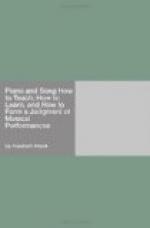* * * * *
It is generally acknowledged that, among other things, I have succeeded more or less with all my scholars in the attainment of a fine touch. People desire to obtain from me the requisite exercises for the development of this; but not much can be gained from these. The important thing is how and when they are to be used; and that most careful attention shall be paid in the selection of other etudes and pieces, in order that nothing shall be played which shall endanger the confirmation of the correct touch already acquired, or shall undo what has been accomplished in the lessons. As I have said before, it does not depend upon much practising, but upon correct practising; and that the pupils shall not be allowed to fall into errors. I am constantly asked, “How many hours a day do your daughters practise?” If the number of hours spent in practising gives the measure of the standing of a virtuoso, then my daughters are among the most insignificant, or in fact should not belong to the order at all.
This is the place for me to explain myself more fully with regard to playing with a loose wrist, in order that I shall not be misunderstood. The tones which are produced with a loose wrist are always more tender and more attractive, have a fuller sound, and permit more delicate shading than the sharp tones, without body, which are thrown or fired off or tapped out with unendurable rigidity by the aid of the arm and fore-arm. A superior technique can with few exceptions be more quickly and favorably acquired in this way than when the elbows are required to contribute their power. I do not, however, censure the performance of many virtuosos, who execute rapid octave passages with a stiff wrist; they often do it with great precision, in the most rapid tempo, forcibly and effectively. It must, after all, depend upon individual peculiarities whether the pupil can learn better and more quickly to play such passages thus or with a loose wrist. The present style of bravoura playing for virtuosos cannot dispense with facility in octave passages; it is a necessary part of it.




